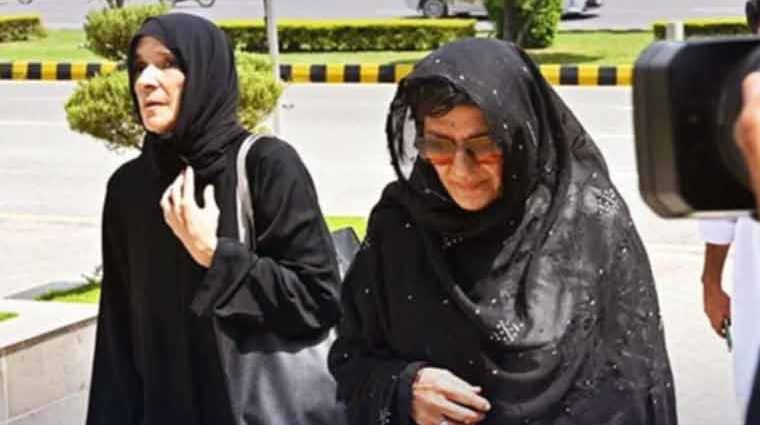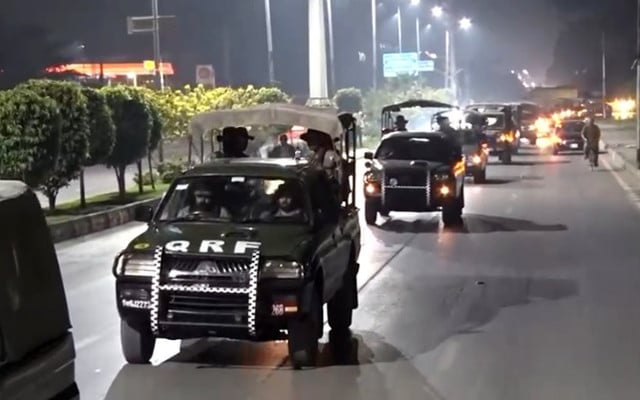
According to official sources, the deployment has been completed, with army troops now stationed across Islamabad and surrounding areas. Their role includes patrolling key locations to safeguard citizens and protect public property, especially with the upcoming Shanghai Cooperation Organisation (SCO) Summit in focus.
“These security measures are essential to protect lives and property, and to ensure peace during this critical period,” a security official stated. The PTI protests have led to clashes with police, prompting authorities to take additional steps to control the situation.
The protests, which saw PTI workers gathering at D-Chowk, led to tear gas shelling by police to disperse the crowds. Several PTI workers were arrested at various points, including 26 Number Chungi.
“No one will be allowed to disrupt the peace or create unrest,” the security source stressed, adding that the army’s presence is crucial to neutralising any threats posed by the ongoing demonstrations.
Meanwhile, army units from Khyber-Pakhtunkhwa (K-P) have been dispatched to support security operations in Islamabad and surrounding areas, as tensions rise in the capital amid ongoing Pakistan Tehreek-e-Insaf (PTI) protests.
The move comes as part of heightened security measures to protect citizens and ensure the safety of the upcoming Shanghai Cooperation Organisation (SCO) Summit, according to security sources.
“No one will be allowed to disrupt peace or incite violence during this critical period,” said a security official. “These deployments are aimed at safeguarding the public and ensuring that law and order prevail.”
As the situation intensifies, authorities have tightened the noose around violent groups and armed protesters from both sides of the capital. “The army’s presence is vital to neutralise any threats to public safety,” the official added.
The convoy of Khyber-Pakhtunkhwa Chief Minister Ali Amin Gandapur, en route to join the protest at D-Chowk in Islamabad, is now just 65 kilometres away from the capital.
Police have intensified their crackdown on Pakistan Tehreek-e-Insaf supporters, arresting dozens of workers from key locations including D-Chowk and Chungi No. 26.
To disperse the protesters, law enforcement has been using tear gas intermittently, with the situation remaining tense.
Meanwhile, PTI workers clashed with police on Jinnah Avenue in Islamabad, where law enforcement used tear gas to disperse the protesters. Demonstrators retreated towards China Chowk, with some launching glass marbles at police using slingshots. Two armoured vehicles from Islamabad police were deployed to control the situation.
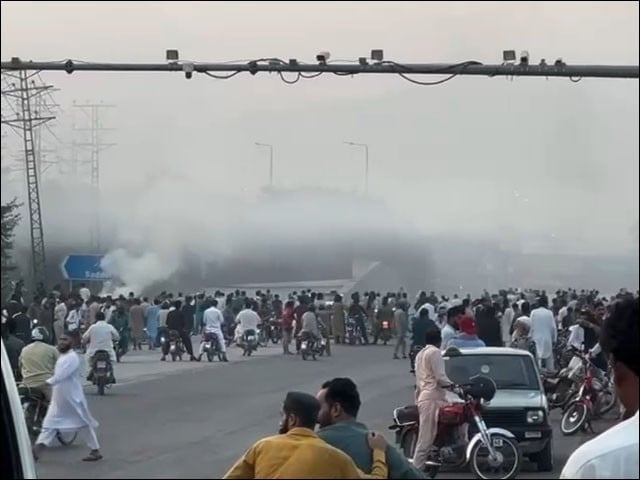
The situation remains tense in both Islamabad and Rawalpindi. PTI supporters had earlier gathered at D-Chowk, prompting police to use tear gas, resulting in the arrest of six protesters. Nationwide, over 30 PTI workers have been detained.
At the Burhan Interchange, clashes broke out between the K-P convoy and the police. Tear gas was fired to control the protestors, with several PTI workers arrested as they attempted to make their way into the capital. Security forces have sealed off all routes leading into Islamabad, cutting off access from Rawalpindi to prevent further unrest.
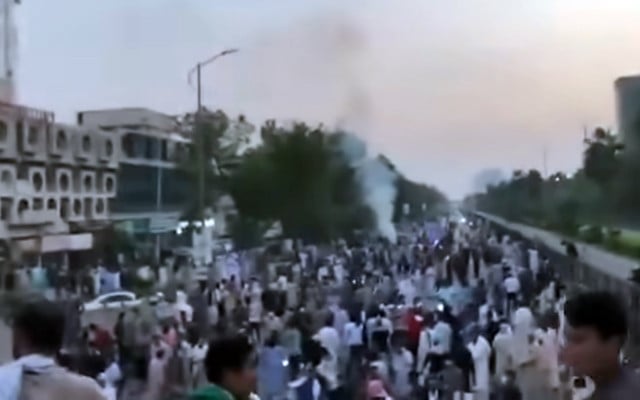
Islamabad police confirmed that three individuals were arrested from D-Chowk, including two civilians and one PTI supporter. Tear gas was used to push back the protesters, who retaliated by chanting slogans against the police.
In Rawalpindi, key roads, including Murree Road, have been blocked for 16 hours, causing severe disruption. Public transport is off the roads, and even motorcyclists are facing difficulties due to the containers and barricades.
Despite heavy security, a female PTI supporter managed to reach D-Chowk, where she shouted slogans in favour of PTI and against the government. Her arrival sparked chaos among the police, who swiftly detained her and moved her to the station.
Several major roads, including Cheering Cross, MH Chowk, and Mall Road in Saddar, have been sealed from both sides, while other key points in Rawalpindi, such as Flashman Road, Marrir Chowk, and Double Road Stadium, remain closed.
Rawalpindi’s City Traffic Police have advised citizens to avoid unnecessary travel due to the ongoing unrest. Motorcycle access is permitted on major roads linking the twin cities, but entry into Islamabad’s Red Zone remains completely blocked.
Amidst the blockade, Pakistan International Airlines (PIA) assured that domestic and international flights would continue as scheduled. Passengers are advised to plan their airport journeys carefully, using alternative routes.
In Punjab, Section 144 has been imposed in Lahore, Rawalpindi, Attock, and Sargodha, with a ban on political gatherings, protests, and demonstrations. Rangers have been deployed in Rawalpindi, Attock, and Lahore to maintain law and order during the protests.
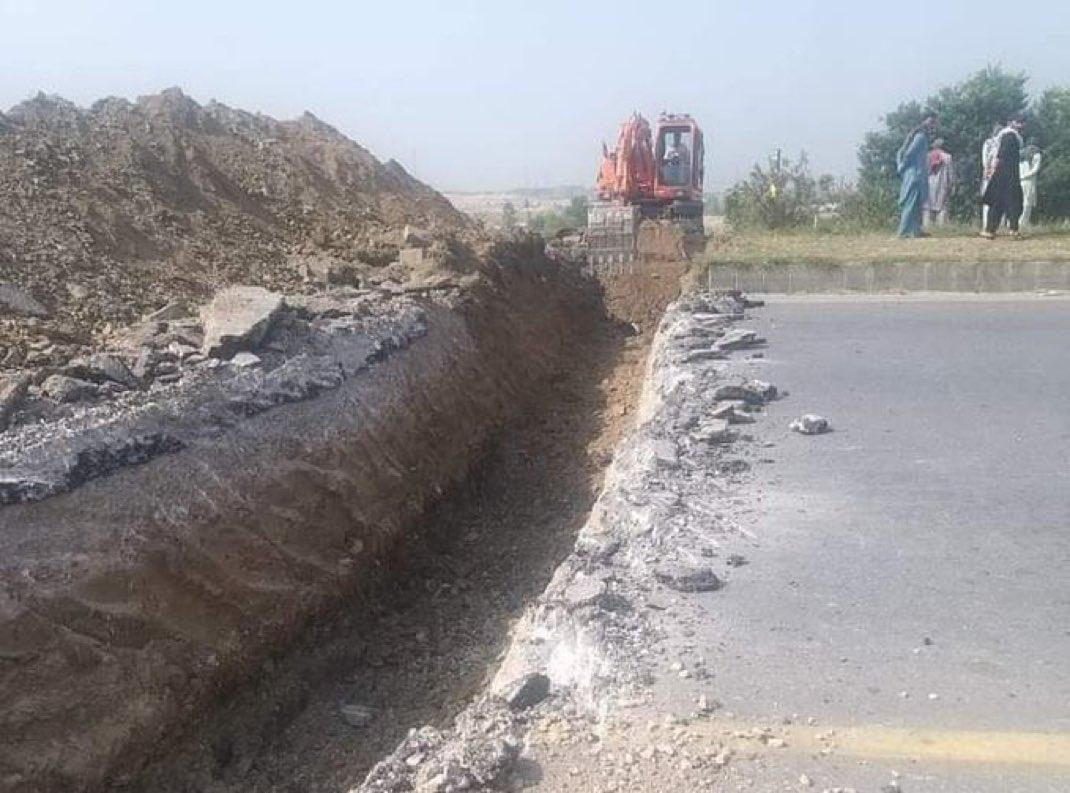
Rawalpindi Metro Bus services remain suspended, and double-riding on motorcycles is prohibited across the city. Islamabad police continue to enforce Section 144, urging citizens not to engage in illegal activities.
For those travelling to or from Islamabad, authorities recommend keeping updated with traffic advisories. The situation remains tense, with security on high alert as PTI protests continue to unfold across the region.
Islamabad police have strengthened their presence at the 26 Number Chungi area, as protests by Pakistan Tehreek-e-Insaf (PTI) escalate across the city.
According to reports, Deputy Inspector General (DIG) Headquarters arrived at the location with an additional 300 officers, bringing the total police force in the area to 750, under the supervision of Islamabad’s Senior Superintendent of Police (SSP) Operations. The police have been equipped with 2,000 tear gas shells, 12-bore guns, and rubber bullets to control the situation.
Despite the heavy security, no PTI workers managed to reach the 26 Number Chungi from morning until 7pm.
Inspector General of Police (IGP) Islamabad, Ali Nasir, visited the site and met with personnel from the Rangers, police, and Anti-Terrorism Squad, boosting the morale of the deployed forces.
Islamabad police are equipped with anti-riot gear, and Rangers have been stationed to assist. Frontier Constabulary (FC) personnel are also supporting Islamabad police in securing the area.
In Rawalpindi, continuous tear gas firing by police at Faizabad has caused severe distress among local residents. Tear gas shells were fired into residential areas along the Expressway, with families experiencing breathing difficulties due to the heavy shelling.
As evening approached, PTI protesters hiding in alleyways emerged, chanting slogans. In response, Rawalpindi police fired tear gas on Murree Road to disperse them.
A PTI convoy from Peshawar reached Katti Pahari near the M-1 Motorway, where Attock police fired tear gas from the bridge and hilltop. Protesters retaliated by throwing stones, turning the area into a battleground. The police parked containers and trucks, deflating their tyres to block the road and hinder the protesters.
City Police Officer (CPO) of Rawalpindi, Khalid Hamdani, led a large police force to the Rawalpindi-Attock boundary. The force, including Elite Force and Dolphin squads, is stationed at the Taxila point, ready to confront the advancing PTI convoy.
In a separate incident, Islamabad police severely beat Dawn News journalist Tahir Nasir while he was covering the protests. The police allegedly took his wallet under the pretext of checking his ID card, slapped him, and beat him with a rifle butt. There was also an attempt to snatch his mobile phone.
Meanwhile, PTI workers and police clashed on Jinnah Avenue in Islamabad. The police fired tear gas in an attempt to disperse the protesters, who retreated towards China Chowk. Some PTI workers used slingshots to fire glass marbles at the police. Two armoured vehicles of Islamabad police were deployed to the scene.
The situation in Islamabad and Rawalpindi remains tense as the protests continue.

